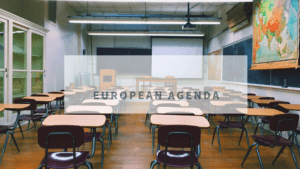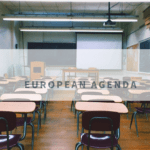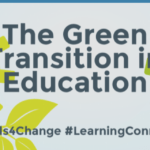The European Union, through its various institutions and agencies, continues to propose support measures in the field of culture and education, focusing on the well-being of Europeans and increased educational opportunities throughout the Member states. These days the focus has been on digitalization and the budget for education and culture.
To this effect, we point out below significant events in this agenda:
| INSTITUTIONS | MEETINGS/DATE | |
| European Parliament | 15 March 2021 | 16 March 2021 |
[toc]
March 2, Government of Ireland: Culture Ireland’s Global Online Arts Festival
Minister Catherine Martin TD has announced details of Culture Ireland’s online festival for mid-March which is designed to celebrate Irish arts worldwide at a time when Irish artists normally travel the globe, presenting and sharing our culture on international stages.
The festival, entitled SEODA, meaning jewels, includes many of Ireland’s finest artists and companies and covers all art forms from architecture to visual arts. This 5 day festival running from 17-21 March is an ambitious programme to ensure Irish artists reach audiences worldwide, including the diaspora and new audiences where Irish artists may not have travelled previously. The festival is also available free online in Ireland, through Culture Ireland’s YouTube channel.
Minister Martin said
Our artists are Ireland’s treasures and despite the many challenges this year, our artists continue to create and perform in innovative ways. Through sharing a selection of amazing performances in line with the aims of Global Ireland, we can reach audiences around the world and maintain our cultural connections and offer hope and joy at this time when Irish culture holds a central place on the world stage.
Featuring The Abbey, CoisCéim Dance Theatre, Druid and Rough Magic/Kilkenny Arts Festival, Stephen Rea, Sinead Gleeson, Martin Hayes alongside Irish work from New York, London & Paris, the 5-day festival will offer audiences more than two dozen events to enjoy.
More information
Goverment of Ireland – Press Release
Culture Ireland – Festival information
Youtube – Culture Ireland’s official channel
February 26, European Comission: Workshop on complementary funding for cultural heritage
The European Commission organised a workshop on complementary sources of funding for cultural heritage, for Member States and heritage stakeholders.
It is crucial to secure funding for cultural heritage in order to ensure the sector’s sustainability. The COVID-19 crisis made it clearer than ever that it is necessary to find alternative ways for funding that complement the support offered by Member States’ budgets.
A workshop for Member States and heritage stakeholders
For this reason, the Directorate General for Education, Youth, Sport and Culture organised a workshop on complementary sources of funding for cultural heritage on 25-26 January 2021.
EU Member States representatives, heritage stakeholders and members of the Commission’s expert group on cultural heritage participated together with representatives of European regions.
Lessons learned from best practices
The workshop focused on the exchange of best practices from Member States. Presentations during the 2 days covered examples of the following instruments:
- public-private partnerships (Poland, Croatia and Italy)
- crowdfunding and fundraising (Ireland, Greece)
- lotteries (Germany, France and the Euro Jackpot)
- donations (Belgium) and mixed sources
Representative of the European Investment Bank Institute focused on how to make cultural heritage interesting for private investors. The director of the European Cultural Foundation talked about the role of philanthropy and foundations.
More information
European Commission – Workshop
February 19, Informal video conference of education ministers
Education ministers met on 19 February 2021 through videoconference to discuss how to best address persisting challenges in equal access, inclusion and educational success for all in education and training. The presidency informed ministers on efforts towards the establishment of the new framework for European cooperation in education and training until 2030, including the achievement of the European Education Area. The presidency also informed ministers on its initiative to launch an online platform facilitating data sharing between the member states on coping with the COVID-19 pandemic in education and training.
In a public session, ministers exchanged views on the best policy practices and shared exemplary achievements towards achieving equity in access, inclusion for all in education at EU, national, regional and local levels. Several ministers reiterated the heavy impact of the COVID-19 pandemic on education, stressed the importance of face-to-face learning and focused on the need to promote further pre-school education. Ministers also highlighted the need to ease the access to education for children and adults with special educational needs, for immigrants and refugees, and for those in risk of social exclusion. Following this policy debate, the presidency will work with the member states to adopt Council conclusion on this topic during the next meeting of education ministers in May 2021.
The presidency also informed ministers on a Council resolution on a strategic framework for European cooperation in education and training towards the European Education Area and beyond (2021-2030). The Council approved this resolution on 18 February 2021 through a written procedure. The presidency highlighted the five strategic priorities of the resolution together:
- Improving quality, equity, inclusion and success for all in education and training.
- Making lifelong learning and mobility a reality for all.
- Enhancing competences and motivation in the education profession.
- Reinforcing European higher education.
- Supporting the green and digital transitions in and through education and training.
More information
European Council – Video conference of education ministers
February 10, European Parliament’s plenary session: EU recovery instruments must also support young people and sports sector
MEPs call on the Commission and member states to increase their efforts to prevent the pandemic from having lasting negative effects on young people and the sports sector.
“Both the EU’s recovery instruments and national recovery plans must offer short-term support to the sports sector and to our young people”, said Sabine Verheyen (EPP, DE), Chair of Parliament’s Committee on Culture and Education. “We must attend to the most vulnerable and we need greater flexibility to support all types of education, including vocational and informal learning. We must also increase investment in the digital transition.”
Helping young people deal with the pandemic
MEPs stress that the youth labour market is particularly sensitive to economic crises, with many working in unstable, low-paid, part-time jobs that are not legally well protected and have weaker social security standards. Data show that young people’s employment opportunities and income are particularly hit by the pandemic; MEPs fear that education, volunteering and training opportunities are disappearing.
National recovery plans must therefore focus on young people, and EU programmes (such as Erasmus+, European Solidarity Corps, Youth Guarantee, Digital strategy) must be harnessed to avoid “bitterly disappointing young people and future generations”, MEPs stress. Tailored schemes to retain and create jobs and retraining must be invested in, and vulnerable groups must be better protected, they add.
Guarantee recovery measures for sports sector
MEPs highlight the devastating consequences of the pandemic on the sports sector, which accounts for 2.12% of European GDP and 2.72% of total employment in the EU – representing around 5.67 million jobs.
They are concerned about possible lasting damage to professional and grassroots sports and, as a consequence, to public health in general . Member states should therefore support sports with national funds and include them in their recovery plans. In addition, the sector should have full access to the Recovery and Resilience Facility as well as sectoral programmes, such as the Regional Development Fund, Cohesion Fund and EU4Health. An EU-wide approach is needed to help the sector recover, notably by addressing recovery within the EU Work Plan for Sport.
More information
European Parliament – Press Release (Plenary Session)
February 4, Eurydice: Equity in school education, why is it important and how to improve it
If a fair society is meritocratic, enabling every person to progress on the basis of their achievements, then equity in school education is essential. Imagine that regardless of your merit, no matter how hard you tried, you could never improve your socio-economic status. Worse, imagine that the same applied to your children. Despite their efforts to fare better in life, they are deprived of the necessary means to climb the socio-economic ladder. This may be bearable and even welcome to the better off, but to the less fortunate it is simply suffocating.
The 2020 Eurydice report Equity in School Education looks at education system-level factors that could potentially affect equity (defined as small achievement gap between top and bottom performers and as achievement being independent of socio-economic status). These factors reflect how stratified or standardised an education system is, the available support instruments and the public funding level.
Drawing on original data from 42 European education systems and on the Eurostat, PIRLS, PISA and TIMSS databases, the Eurydice study reaches some striking conclusions. In one sentence, stratification is not good for equity and neither standardisation nor support measures can counterbalance the adverse effect of a highly stratified education system.
The study finds different variables influencing equity in primary schools and in secondary, although common elements exist. More specifically, what appears to matter more at the primary level is the amount of public funding per student and the size of the (government-dependent) private schools sector. Academic segregation remains an important predictor of achievement gap also at the secondary level, but now segregation is a correlate of the age when tracking begins and the size of the vocational education sector. Interestingly enough, grade repetition has a direct and negative effect on equity adding to the argument that grade repetition is counterproductive.
In a nutshell, the study shows that the keys to improving education are:
- Increase public funding for primary level education
- Apply uniform school choice and admission rules
- Delay tracking as long as possible
- Spread low-performing students across schools
- Reduce grade repetition rates
More information
February 3, European Parliament’ study: Cultural and creative sectors in post-COVID-19 Europe
Cultural and creative sectors (CCS) have been hit hard by the consequences of the COVID-19 pandemic. This study analyses the so far effects of the crisis on the CCS, as well as the policy responses that are formulated to support the sectors. Based on the analysis, policy recommendations are formulated to further improve the resilience of the CCS in Europe in the medium and longer term.
The presentation of the study took place at the CULT Committee meeting on 25 February 2021 and focused on the following topics:
- Pre-COVID-19 situation in the CCS
- Effects of COVID-19 on CCS, together with a sub-sector impact heatmap
- Analysis of emergency and relaunch policy support for CCS on European and national level
- Perspectives beyond the COVID-19 crisis
- Policy recommendations for a long-lasting, COVID-19-proof and sustainable recovery of the sectors
More information
Previous Agendas
Recommended Bibliography
Compendium of inspiring practices on inclusive and citizenship education
The role of local and regional authorities in achieving a European education area by 2025







Leave a Reply